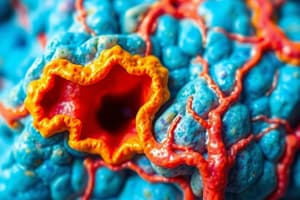Podcast
Questions and Answers
Which type of epithelial tissue consists of a single layer of cells?
Which type of epithelial tissue consists of a single layer of cells?
- Stratified Epithelium
- Areolar Tissue
- Simple Epithelium (correct)
- Columnar Tissue
What is the main function of epithelial tissue?
What is the main function of epithelial tissue?
- Facilitate the exchange of nutrients and waste products
- Create barriers against the external environment (correct)
- Provide support and bind organs
- Help in forming collagen fibers
What is the role of connective tissue in the body?
What is the role of connective tissue in the body?
- Regulate the passage of substances in and out of the body
- Facilitate the exchange of nutrients and waste products
- Provide support and bind organs (correct)
- Cover the body's surface
How does stratified epithelium differ from simple epithelium?
How does stratified epithelium differ from simple epithelium?
Which component is NOT found in the matrix of connective tissue?
Which component is NOT found in the matrix of connective tissue?
What is another name for areolar tissue?
What is another name for areolar tissue?
What type of tissue is responsible for generating movement and maintaining posture in the body?
What type of tissue is responsible for generating movement and maintaining posture in the body?
In which type of muscle tissue is responsible for involuntary movements?
In which type of muscle tissue is responsible for involuntary movements?
What is the main function of adipose tissue?
What is the main function of adipose tissue?
Which type of muscle tissue is found in the heart and is responsible for pumping blood?
Which type of muscle tissue is found in the heart and is responsible for pumping blood?
What kind of cells make up nervous tissue?
What kind of cells make up nervous tissue?
Which type of connective tissue forms the skeletal system and provides structural support?
Which type of connective tissue forms the skeletal system and provides structural support?
Flashcards are hidden until you start studying
Study Notes
Tissues: The Building Blocks of Life
Tissues are the fundamental structural and functional units of living organisms, made up of groups of similar cells that work together to perform specific tasks. Just like a well-organized team, tissues ensure the smooth functioning of our bodies. Let's explore the various types of tissues that make up the human organism.
Epithelial Tissue
Epithelial tissue covers the body's surface and lines internal organs, creating barriers against the external environment and regulating the passage of substances in and out of the body. It consists of flat or cuboidal cells with tight junctions between them, forming a continuous layer. Epithelial tissue comes in various forms, such as:
- Simple Epithelium: A single layer of cells that can be squamous (flat), cuboidal, or columnar in shape.
- Stratified Epithelium: Multiple layers of cells, typically cuboidal or columnar, with cells shed from the surface as they become worn out or damaged.
Connective Tissue
Connective tissue provides support, binds organs, and facilitates the exchange of nutrients and waste products. It is made up of cells embedded within a matrix, a non-cellular material containing collagen fibers, ground substance, and other specialized components. Connective tissues are broadly categorized into the following types:
- Areolar Tissue: Also known as loose connective tissue, it fills the spaces between organs and provides support to other tissues.
- Dense Connective Tissue: A more compact version of connective tissue, containing dense networks of collagen fibers.
- Adipose Tissue: Composed mainly of fat cells, adipose tissue stores energy and provides insulation.
- Bone Tissue: A specialized form of dense connective tissue, it forms the skeletal system and provides structural support.
Muscle Tissue
Muscle tissue generates movement and maintains posture in the body. It is made up of cells called muscle fibers, which contract and relax to produce motion. Muscle tissue can be divided into three types:
- Smooth Muscle: Found in the walls of internal organs and blood vessels, smooth muscle is responsible for involuntary movements.
- Cardiac Muscle: Found in the heart, cardiac muscle is responsible for the pumping of blood.
- Skeletal Muscle: Found attached to bones, skeletal muscle is responsible for voluntary movements.
Nervous Tissue
Nervous tissue is responsible for communication within the body. It consists of specialized cells called neurons, which transmit information through electrical and chemical signals. Nervous tissue is organized into two types of tissues:
- Neurons: The primary cells of nervous tissue, they transmit electrical signals called action potentials.
- Neuroglia: Supportive cells that surround and protect neurons, maintain homeostasis, and provide structural support.
Tissue Systems
Tissues are organized into more complex structures called tissue systems. These tissue systems work together to carry out specific functions, such as transportation (circulatory system), digestion (digestive system), and protection (immune system).
Tissues are fascinating entities that make our bodies work. By understanding their types and functions, we can appreciate the intricate organization and interdependence of these units of life.
Studying That Suits You
Use AI to generate personalized quizzes and flashcards to suit your learning preferences.




